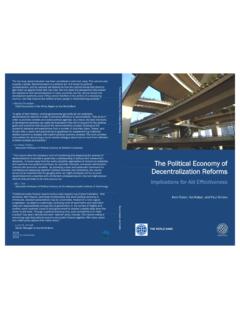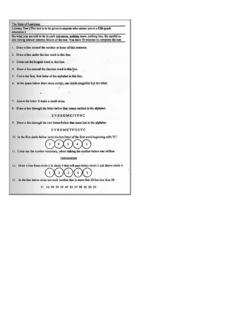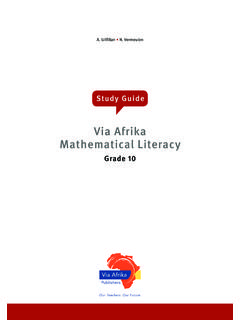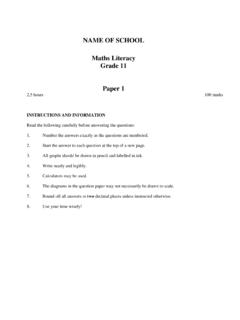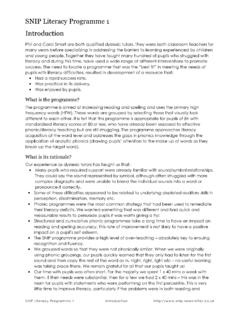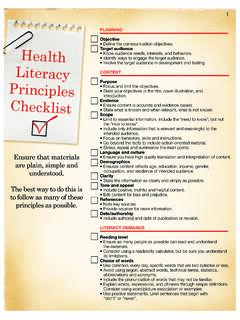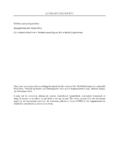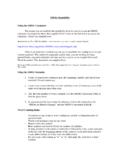Transcription of Skills and Literacy Training for Better Livelihoods
1 Africa Region Human DevelopmentWorking Paper SeriesSkills and LiteracyTraining for Better LivelihoodsA Review of Approaches and Experiences John Oxenham Abdoul Hamid Diallo Anne Ruhweza Katahoire Anna Petkova-MwangiOumar SallAfrica RegionThe World Bank March 2002 Human Development SectorAfrica RegionThe World BankThe views expressed herein are those of the authors anddo not necessarily reflect the opinions or policies of theWorld Bank or any of its affiliated photos by Dr. Josef Mueller, Sankt Augustin, design by Tomoko REGION HUMAN DEVELOPMENT WORKING PAPER SERIESF orewordsivAcknowledgementsvii1 Executive summary12 Prologue63 Objectives of the study94 Scope and methods of the study105 Literacy Training with livelihood components146 Livelihood Training with Literacy components247 Synthesis of findings358 Conclusions and recommendations42 Bibliography and references47 Annex 1 Persons thanked54 Annex 2 Cases from Guinea56 Annex 3 Cases from Kenya74 Annex 4 Cases from Senegal88 Annex 5 Cases from Uganda104 Annex 6 List of programs/projects discussed in detail in the study118 Skills AND Literacy Training FOR Better LIVELIHOODSiiiContentsForewordhis study looks at the intersection betweentraining in livelihood Skills and basic educa-tion for illiterate and semi-literate youth andadults.
2 Can effective Training in livelihood Skills bedeveloped as an add-on to large scale Literacy pro-grams? Or, are the effective combinations those thatadd Literacy education to (usually small scale) pro-grams which are set up mainly to teach livelihoodskills to begin with? To examine such questions theInstitute for International Cooperation of the Ger-man Adult Education Association (IIZ/DVV) wascommissioned to conduct the present investigationwhich examines documentation from 18 programs all serving very poor people, mostly women. Spe-cial analysis is also carried out on four countrycases Senegal, Guinea, Uganda and Kenya. The study concludes that combinations of liveli-hood Skills Training and adult Literacy educationhelp improve poor people s livelihood. Firstly, thereis a widely noted empowerment effect thatlearners acquire enhanced confidence and social re-sources which help them take initiatives to improvetheir Livelihoods .
3 Second, Literacy and numeracyskills are a clear advantage in market transactions inthe informal economy, and thus especially impor-tant for entrepreneurship. Thirdly, more productiveagricultural or livestock practices result from learn-ing new vocational Skills . These effects should not beseen as isolated but as arising from complementaryinputs. For example, not only are Skills and marketopportunity needed, but also access to credit. Theseconclusions also gain support from other reviews onadult basic education or about how people makeends meet in the informal study breaks new ground by finding thatdifferent kinds of staff are needed for teaching voca-tional Skills for teaching Literacy and that livelihoodskills Training is a Better vehicle for teaching literacythan the other way around. This has the importantpractical implication that it is probably best to thinkof combinations of livelihood Skills and literacyteaching as an activity that, like other vocationaltraining, requires intensive support and is not easilyscaled up quickly.
4 The team conducting this study, led by JohnOxenham made extraordinary efforts to assembleexisting documentation on the combined teachingof adult Literacy and livelihood Skills , before under-taking their careful analysis. The study is part of an ongoing regional study ofvocational Skills development conducted by theAfrica Region of the World Bank and its HumanDevelopment Department. Other publications onAdult Basic Education are available from the AfricaHuman Development Department. The NorwegianEducation Trust Fund for Africa has generouslyfinanced the present study and is, along with DfIDand the Bank itself, financing the ongoing regionalstudy of vocational Skills development. This sup-port is very gratefully acknowledged. Birger J. FredriksenSenior Education AdviserAfrica Region, The World BankTivAFRICA REGION HUMAN DEVELOPMENT WORKING PAPER SERIESn April 2000, the delegates at the World Educa-tion Forum in Senegal collectively drew up theDakar Framework for Action, in which theycommitted themselves to do everything possible to: achieve a 50 percent improvement in levels ofadult Literacy by 2015, especially for women, andequitable access to basic and continuing educa-tion for all adults.
5 Improve and ensure excellence in all aspects ofthe quality of education, so that recognized andmeasurable learning outcomes are achieved byall, especially in Literacy , numeracy and essentiallife World Bank was one of the key players in thepreparation and implementation of the Forum,along with UNESCO, UNICEF, and ILO, amongother concerned UN organizations. Our Institutewas involved in the preparatory process in Ger-many and participated in Dakar as a member of thenongovernmental organizations (NGOs) workingin education and development. For us, this markedanother milestone in our almost four decades ofcontinuous support for adult Literacy with partnersin Africa, Asia and Latin the Human Development Sector of theAfrica Region of the World Bank asked whether wewould be interested in managing a study of literacyand Livelihoods , we could not but immediatelyagree on both the importance of the research andour readiness to support it.
6 We considered it a greatopportunity to inject fresh information and ideasinto discussions on approaches to improving liter-acy interventions in practice and theory, whetherfrom our own many projects and publications orfrom the programs and documents of others. Overthe years, our partners have again and againdebated with us questions like, Does Literacy comefirst and development follow? or How much lit-eracy is needed as a prerequisite to development? or How can both be integrated? The issues of therelationships between Literacy , Skills Training , andlivelihoods widen this quest for improved develop-mental outcomes. We think that the title Skills andLiteracy for Better Livelihoods , adequately reflectsthe findings of the study. It is at the same time a pro-grammatic title for future Literacy endeavors bygovernments, NGOs, co-operating agencies, andthe participants is our feeling that the study team has done anexcellent job.
7 At the beginning of the study, a work-shop including the four authors of the countrycases, the lead researcher and members of our staff,created a clear common understanding of the ques-tions and a plan of work. At another workshop atthe end, the five draft reports were reviewed and aset of common conclusions was formulated. Whatyou have in front of you is the team s AND Literacy Training FOR Better LIVELIHOODSvForewordIWe would like to thank the study team and allthose who supported their work. There were indeedmany, especially Jon Lauglo from the World Bankwho was at the heart of the matter and associatedwith the study from its very beginning. We appreci-ated his sound professional input throughout. Wesee the study as an important contribution towardfulfilling our commitment to Literacy learners andtheir providers and to high quality education for (H) Dr.
8 Heribert HinzenHenner HildebrandDirector, Task Manager,IIZ/DVVIIZ/DVVviAFRICA REGION HUMAN DEVELOPMENT WORKING PAPER SERIEShe first acknowledgements must go to theAfrica Region of the World Bank and to theGovernment of Norway. By initiating andfinancing this study, they are helping to enrich afield that has not generated the attention and highquality evaluation and research that the rhetoric ofpoverty reduction, education for all, and lifelongeducation might have led the world to expect. Thenext salute goes to Dr. Josef Mueller, formerly of theGerman Foundation for International Develop-ment, now an independent consultant, for hisTrojan work in collecting and annotating materialsfrom a number of organizations in Germany study itself depended to a large extent on doc-uments that are not in the public domain.
9 Most ofthem had to be identified, located, and retrievedfrom the files and archives of many organizations inmany countries. That meant that many people had tomake the time and take the trouble to suggest whatwork might repay attention, what documentationmight be available, and where it might be also assisted in obtaining the documents,although laying hands on them was not always easyor always successful. The study team is heavilyindebted to them all in the four countries of intensivestudy, Guinea, Kenya, Senegal, and Uganda, and inthe headquarters of many bilateral, multilateral, andnon-governmental agencies in Europe and NorthAmerica. The full list of them is so lengthy, that it isgiven as Annex 1 to this report. Here, only the namesof their organizations will study is indebted also to 13 friends who,despite heavy work programs of their own, troubledto comment rapidly and extensively on the firstdraft of this paper: Terry Allsop, Julia Betts, DiptaBhog, Harbans Bhola, Michael Brophy, John Comings,Pat Davis, Heribert Hinzen, Richard Johanson, JonLauglo, Josef Mueller, Helen Sherpa and Chij hope that they judge their advice has been satis-factorily taken in this revised study team expresses its deep gratitude to allits helpers and supporters and hopes that this prod-uct will help them feel that their time and effortwere well spent.
10 All responsibility for any misre-porting, misunderstanding or misinterpretationthat appears in the report lies with the team. In GuineaAide et ActionCAOPALa Mission Fran aise de Coop rationen Guin e travers le Centred Appui aux OrganisationsProfessionnelles Agricoles de Kankan CENAFODLe Centre Africain de Formation pourle D veloppementLes centres alpha avec leurs auditeursnous ont permis d enrichir le pr sentdocumentCLUSALa Ligue des Coop ratives des EtatsUnis d Am rique en Guin e EUPD L Entraide Universitaire pour leD veloppement Le Forum des ONG de Guin eSKILLS AND Literacy Training FOR Better LIVELIHOODSviiAcknowledgementsTIIZ/DVV Institute for International Cooperationof the German Adult EducationAssociationPAPE-BGNLe Projet d Appui aux PetitsExploitants en Basse Guin e NordSNALe Service National ded alphab tisation en Guin e UNICEF-Le Fonds des Nations Unies pour GUINEEl Enfance en Guin e In KenyaBTLB ible Translation and LiteracyDAED epartment of Adult EducationFAOFood & Agricultural




